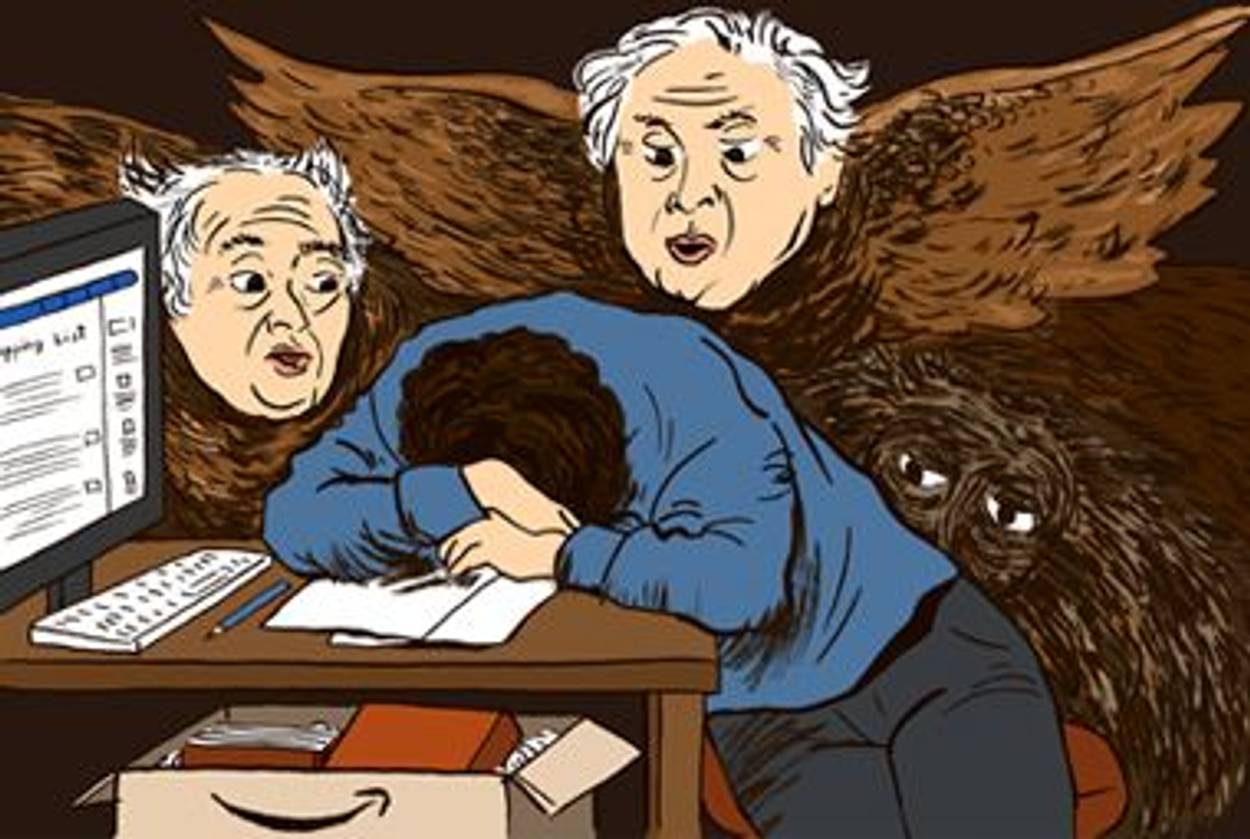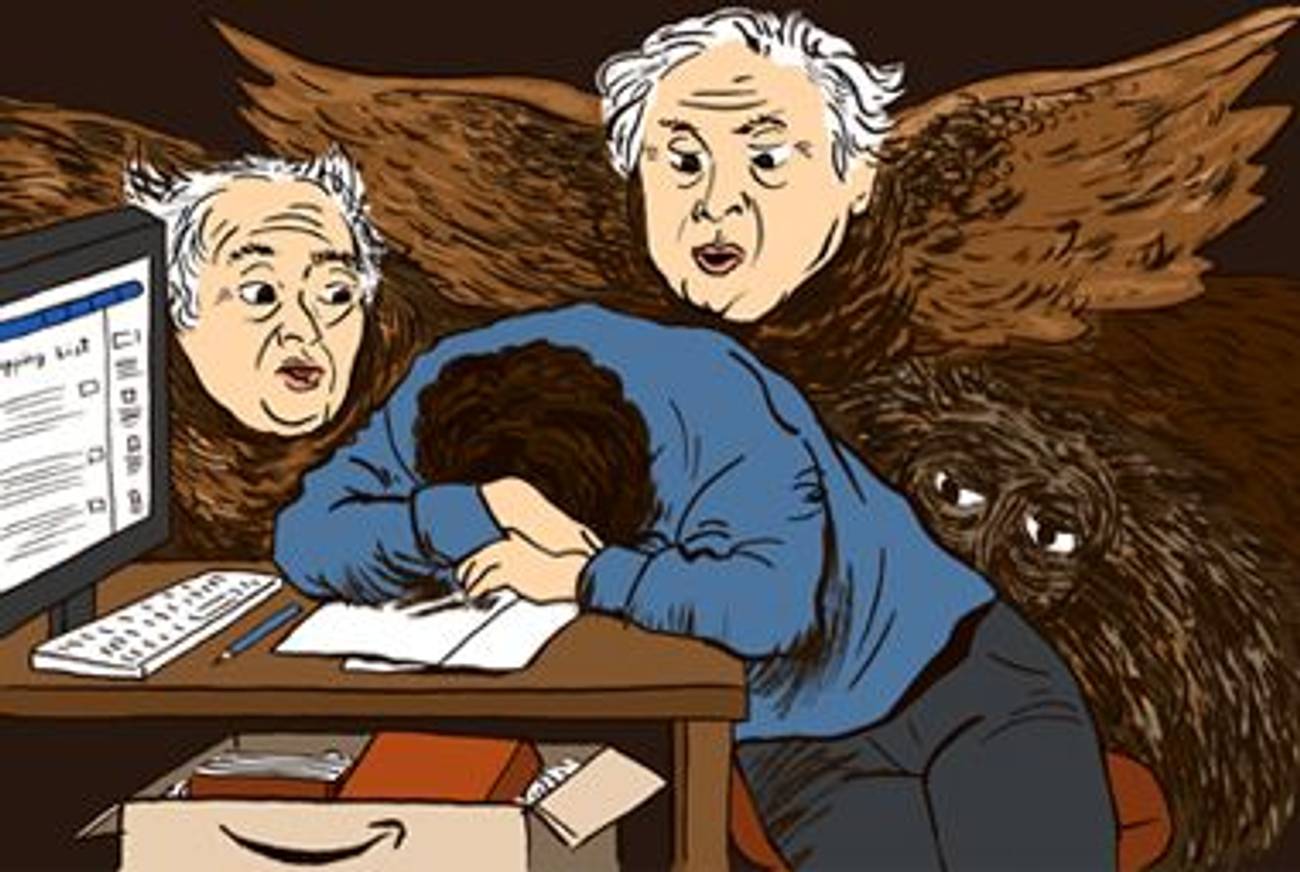High Anxiety
Faced with a story I wanted to start but felt certain I couldn’t, I turned to the literary gods. Now Harold Bloom owes me $213.27.




I had this idea for a story. I won’t tell you what it was, but it was good. Really good. It was great. Maybe not great, but good. It was OK. It was all right.
And so I did what I always do when I begin a new story, when the anxiety of influence isn’t remotely as crippling as the influence of anxiety: I tell myself I can’t possibly write it. I shouldn’t even bother. I need to learn more. I didn’t go to college, after all. I purchase a lot of books, yes, but I don’t finish most of the ones I begin, and the ones I do finish I rarely enjoy; the critics say it was hilarious and I didn’t laugh once; they say it was heartbreaking and I find it melodramatic; they say it was unique and I find it’s another goddamned story about a dying old guy in bed looking back on his life. Does he die? Don’t ruin it for me!
I’m missing something. Those other writers know something I don’t. I need help. I need guidance.
I need, I decided, Harold Bloom.
I don’t know why it was Harold specifically. It’s not just the jowls. It’s not just the Yale/Shakespeare thing. I’m ashamed to admit that while I don’t like gods, I feel at times that I need one; that day, faced with a story I wanted to begin but was certain I couldn’t, I needed Harold Bloom.
And Amazon had him.
Amazon has Harold Bloom up the wazoo—557 hits on his name, and that was just under Books—and I had an American Express card that was valid for two more weeks. I suspected the story I wanted to write might have something to do with alienation, whatever that was, and so I all but cheered aloud when I saw this:
Alienation (Bloom’s Literary Themes)
[Hardcover]
$42.14
Only 9 left in stock—order soon!
They didn’t have to tell me twice. A commenter (5 stars) was kind enough to provide the book’s back cover copy:
The volumes in this series are designed for students and general readers interested in a wide-range of world literature dealing with perennial themes. … Harold Bloom writes: “every theme in this series touches upon a contest with anteriority, whether with the presence of death, the hero’s quest, the overcoming of taboos, or all of the other concerns.”
“A contest with anteriority?” Sweet.
Suck it, bitches, I thought to myself as I added the item to my cart. Suck it, New York Times Book Review, suck it London Review of Books, suck itNew York Review of Books. I’ve got the secrets now—Harold Bloom, OK, motherfucker? The Suge Knight of literary critics. Who’s going to bring it against Harold Bloom, who? Wood? Showalter? Please. Nobody can roll with the Bloom. And I had him.
Just try not liking my story, lit crits. I’m going to alienate the fuck out of this character.
Customers buy this book with The Hero’s Journey (Bloom’s Literary Themes).
Price for both $76.50.
I had to admit I was a little weak on the whole hero/Joseph Campbell/Thousand Faces shit. I couldn’t get through that book, I tried. But it just depressed me; if there’s a pattern, I don’t want to know about it. I’m trying to pretend life is infinitely varied and interesting, OK, Joe? Stop trying to cram it all into one goddamned story.
I knew George Lucas based Star Wars on it somehow, and I’ve never seen Star Wars; Jesus Christ, I’m going to write a book with a hero and I’ve never seen Star Wars. I’ve seen Space 1999, does that count? Does anybody know if Space 1999 counts?
Add both to Cart.
2 items added to Cart.
Customers who bought Alienation (Bloom’s Literary Themes) also bought The Trickster (Bloom’s Literary Themes), The Taboo (Bloom’s Literary Themes), Human Sexuality (Bloom’s Literary Themes), and Death and Dying (Bloom’s Literary Themes).
Goddamn it.
4 items added to Cart.
There are 6 items in your Cart.
Order total: $213. 37
Who can put a price on knowledge? To pay $200 now for a National Book Award (at least) later seemed like a pretty good deal. I paid extra for Two-Day Shipping. (For some reason, The Hero’s Journey journey was going to take 3 to 4 weeks to conclude at my post office, so I paid even more to have my items shipped separately.) And when the boxes arrived a couple of days later, I tore them open like something I would determine after reading the Bloom book about metaphor.
I should say straightaway that Harold Bloom is obviously a very busy man. He didn’t write the essays in these books; he simply commissioned them. But I’ll sum them up this way: When I was a child, my rabbis told me horrifying stories of what hell would be like—liars would be hung from hooks by their tongues, thieves would have their arms torn off, masturbators would be—well, let’s just say there’s a dumpster behind Purgatory marked “Testicles Only,” and I don’t envy the garbage men. But none of that makes my blood run as icy cold as the idea of being tied to a dungeon wall while a man in a tweed blazer reads to me from Bloom’s Literary Themes for the rest of eternity.
Please, God, I beg before the first day is out, have mercy upon me and tear my balls off.
These books made me hate books I love.
They made me decide not to read books I had intended to read.
They made me swear off authors’ entire life-works.
None of that is surprising. I kind of expected that.
What was surprising, though, was that as I stared at the $213.37 pile of Missing-the-Point on my desk, I realized that not only had I not learned anything more than I already knew $213.37 ago, I was convinced somehow that I knew even less.
That I was even farther away from beginning my story.
Which, I then realized, was exactly the point.
One of the favorite subjects of discussion among aspiring writers is how writers start writing; what they do to “jump-start their creative engines.” Some writers recommend doing something physical. Some recommend reading from cherished books; others suggest copying favorite passages into a notebook. Then there are the exercises: Pretend you’re a robot and that you’re writing to your mother who’s a human and sleeping with your robot friend who doesn’t know it’s your mother. There are books full of such exercises and suggestions, from the simple to the surprising. What they all have in common, of course, is that they don’t work. Not for me, anyway, and I suspect for many others, because the problem often isn’t what we do to start writing, it’s what we do to stop ourselves from writing.
Why would I stop myself from writing? Guilt. Fear. Guilt. Insecurity. Possibly guilt. It isn’t that my creative engine needs a jump-start; it’s that I pour sand in my own gas tank.
It isn’t the fear of what I don’t know; it’s the fear of what I might find out, of what I might say, of what I might achieve.
So, I hit the brakes.
Hard.
I need to know more, I say to myself. What did Beckett say about Whatever? How did Joyce solve the problem of Something? Did Sterne’s Tristram Shandy employ an unreliable Who Gives a Shit?
(Sterne didn’t, that much is clear.)
Some people waste the day online. Others get drunk. For a long time, pot was my stopping weapon of choice. I didn’t acknowledge it at the time. I used to tell myself that the only time I smoked pot was when I wasn’t writing, until I realized I had the equation exactly wrong: The only time I didn’t write was when I was smoking pot. Pot stopped me cold. These days I don’t use pot to stop myself from writing, not just because I have children, but because I found something better: Harold Bloom.
If you want to write, said Brenda Ueland, try taking a walk.
If you don’t want to write, try pot.
If you’re feeling guilty, worried, guilty, nervous, afraid, or guilty—try Harold Bloom.
And if you’re Harold Bloom: You owe me $213.27, bro.
Shalom Auslander is the author of Foreskin’s Lament, Hope: A Tragedy, and most recently Mother for Dinner. His new memoir, Feh, will be published this July. He writes The Fetal Position on Substack, so make that seven Nazis.